The Health and Environmental Funders Network (HEFN) experienced a transformative 2019, welcoming a new executive director and celebrating a momentous 20 years of building bridges across environmental and health philanthropy. Within these memorable milestones, HEFN continued to be guided by its strategic direction in advancing solutions, building leadership, and expanding investment in environmental health and justice. HEFN provided high-quality information and valuable opportunities for funder colleagues to collaborate through an inclusive, collegial learning community with a deep commitment to equity, public health, and environmental protection.
HEFN enters 2020 energized to sustain the momentum and accomplishments from the past year and offers sincere thanks to the dedicated community that championed and supported the network’s accomplishments in 2019.
Here’s an overview.
Advancing Solutions

Priorities for HEFN “advancing solutions” work included addressing impacts of oil and gas; accelerating transitions from toxic to safer chemicals and materials; promoting health and equity in addressing climate change; and safeguarding children’s environmental health through work on lead poisoning prevention and clean drinking water.
Addressing health, environmental, and community impacts of the oil, gas, and petrochemicals economy.
HEFN expanded its “Past Petro” work, both within and outside its membership with a flurry of activity throughout 2019, including two highly attended events.
Nearly 100 funders participated in a webinar on “Defusing Some of the Biggest Climate and Health Bombs,” moderated by author Bill McKibben in August, and co-sponsored by HEFN, the Climate and Energy Funders Group (CEFG), Environmental Grantmakers Association (EGA), the Funders’ Network for Smart Growth and Livable Communities (TFN), and Rachel’s Network. In September, HEFN’s Past Petro working group leaders coordinated a themed dinner that drew 45 funders together for collaborative discussion at EGA’s Annual Fall Forum.
The two events augmented the Past Petro working group’s monthly calls where outside experts briefed funders on the latest in oil and gas developments. In 2019, funders learned from nearly a dozen experts on topics such as greenhouse gas emissions from the plastics lifecycle; the global impact of plastics on human health; and increased risks of cancer and pre-term births near fossil fuel development. The group also delved into collaborative advocacy work by forest, justice and clean energy advocates in the southeast. And timely calls kept funders apprised of national and international efforts by the Global Gas & Oil Network and the Property Rights and Pipeline Center to hasten a managed decline of oil and gas production.
Accelerating transitions from toxic to safer chemicals and materials.

As the Trump Administration persisted in dismantling environmental protections, HEFN leveraged its close partnerships with philanthropy-serving organizations (PSOs) on two webinars that kept funders abreast of timely topics in the toxics arena.
In March, HEFN hosted the webinar, “Going to the MATS: What’s at stake and at play for health, climate, environmental regulation, and environmental justice.” Funders learned how various groups were fighting proposed changes by the current administration to weaken the Mercury and Air Toxics Standards (MATS) rule. The conversation included speakers from the American Lung Association Healthy Air Campaign, the Climate Action Campaign, the Clean Air Task Force, and We ACT for Environmental Justice. Karen Harris, John Merck Fund, moderated the interactive learning session, co-sponsored by CEFG, EGA, and TFN.
HEFN also partnered with Rachel’s Network on the “Pollution Knows No Borders” webinar hosted by Pure Earth in September. The learning opportunity highlighted global work to reduce pollution in low- and middle-income countries by improving toxic practices and cleaning up contaminated sites.
HEFN’s annual meeting embedded toxics advocacy work and successes into the program through a plenary panel discussion. Planners also organized a site visit to hear from frontline community organizations and their progress on statewide organizing for a healthier San Joaquin Valley. The meeting also acknowledged critical toxics funder work during a HEFN History segment where Janet Maughan, Passport Foundation, spoke about the vital role of HEFN members to reform the U.S. Toxic Substances Control Act.
Improving health and equity outcomes by addressing climate change.

HEFN kicked off its new Climate, Health, and Equity Impact Project in 2019 to improve health and equity outcomes by expanding philanthropic investment in those communities most impacted by climate change. In July, staff helped plan and attended a PSO Learning Exchange supported by TFN in Cleveland, Ohio. The event convened seven PSO partners – the Biodiversity Funders Group (BFG), CEFG, EGA, Grantmakers In Health (GIH), and the Sustainable Agriculture and Food Systems Funders (SAFSF), resulting in joint commitments to action.
HEFN worked in consultation with funder and PSO partners to design and release a 2019 Funder-Nonprofit Climate, Health, and Equity Survey in September, aiming to map various areas of activity and views on field needs and opportunities. A leadership group strengthening the survey design included funders from the Kresge Foundation, Robert Wood Johnson Foundation, ClimateWorks Foundation, the Heinz Endowments, and New York Community Trust. More than 90 foundations and 100 nonprofits around the U.S. responded to the survey. HEFN will disseminate the survey findings in 2020 through webinars and at sessions at various PSO meetings throughout the year.
In April, HEFN offered funders the opportunity to hear about innovative research through the webinar, “Not the Love Boat – Connecting respiratory health with the shipping industry and toxic fuel.” The network partnered with EGA, the Pisces Foundation, and the Gordon and Betty Moore Foundation to spotlight concerns to human health and climate impacts of burning heavy fuel oil by the cruise industry.
Improving children’s and communities’ environmental health.

Children’s environmental health was a focal point this year with the launch of the Lead Funders Action Network supported by HEFN, in addition to activities for funders interested in safe drinking water issues.
HEFN supported the Lead Funders Action Network (LFAN), an active group of national, regional, state, and local foundations, with webinars, blog posts and a working group meeting toward its goal to ramp up solutions-focused collaboration to address the urgency of childhood lead exposure. LFAN members Rebecca Morley, Robert Wood Johnson Foundation, and Daniel Cohn, Mt. Sinai Health Care Foundation, detailed the collaborative’s work in HEFN’s June Giving InSight blog post, New ‘Lead Funders Action Network’ Aligns Philanthropic Efforts for Children’s Health.”
An October working group meeting, hosted by The Joyce Foundation in Chicago, Illinois, generated robust discussions on members’ progress on state and regional advocacy work in New York, the Lead Safe Cleveland Coalition, and lead safe home funds. A related Oct. 9 Health Affairs Grantwatch blog post, “The Surprising Roles That Landlords (And Philanthropy) Can Play In Promoting Children’s Health,” by LFAN members Daniel Cohn, Mt. Sinai Health Care Foundation, and Cara Matteliano, Community Foundation for Greater Buffalo, delved into examples of how both place-based and national funders are funding efforts to prevent lead poisoning.

South Fork of Snake River, Idaho. Source: Bob Wick, Bureau of Land Management (cover photo)
Funders interested in improving children’s environmental health and access through safe drinking water heard about three hubs of activity tackling drinking water challenges at the April webinar, “Activity on Tap: Looking Across the Drinking Water Landscape.” Attendees learned about partnerships and action by the US Water Alliance; the Lead Service Line Replacement Collaborative; and the Children’s Environmental Health Network, working with the National Environmental Health Partnership Council and Clean Water for All campaign. BFG, EGA, TFN and GIH cosponsored the webinar, which highlighted various hubs of activity around drinking water, in tandem with a newly released report by the Water Foundation. Webinar moderator, Juliet Christian-Smith, Water Foundation wrote the HEFN Giving InSight blog post, “Securing Safe Drinking Water for All” in conjunction with the event.
HEFN’s 2019 Annual Meeting in Fresno addressed drinking water concerns and strategies through a plenary panel and a site visit to hear about water resiliency challenges from residents in the unincorporated communities of Lanare and Cantua Creek. Attendees were also invited to a breakfast roundtable hosted by the Charles Stewart Mott Foundation and the Water Foundation featuring grassroots leaders from the Leadership Counsel for Justice and Accountability and Freshwater Future, who spoke about their community-level work to protect clean water for health and justice.
Building Leadership
HEFN sustained its efforts to strengthen field leadership and philanthropic champions to mobilize philanthropy around environmental health and justice solutions at its annual meeting and other venues.
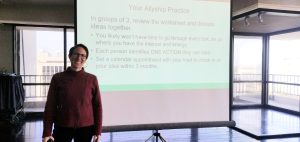
To deepen its own funder leadership, HEFN’s Steering Committee held a spring 2019 retreat in Ithaca, New York. Leadership reflected on HEFN’s first 20 years and refined plans for moving ahead. The Steering Committee shared out priorities in diversity, equity, and inclusion with members by hosting an annual meeting lunch program led by Rachel Humphrey, Justice Funders. The interactive and engaging session explored the concepts and practices of “Allyship” through small and large group discussions. The program aimed to boost attendees’ skills in building relationships based on trust, consistency, and accountability with marginalized individuals.
HEFN continued to build grassroots field leadership through the second year of its Field Partner program, through which HEFN members were invited to bring one grantee as their guest to the 2019 Annual Meeting.
In March, then-Executive Director Kathy Sessions shared lessons from HEFN’s 2018 equity-focused community of practice in a breakout session on “Building the Case: Taking Risk to Advance Water Equity” at TFN’S 20th anniversary meeting. Kathy joined speakers from The Joyce Foundation, Turner Foundation, and Leonardo DiCaprio Foundation and moderator Jalonne L. White-Newsome of The Kresge Foundation. Funders engaged in peer sharing and learning on building the case internally for water equity, supporting equity-focused groups, and bridging the rural/urban water-divide. They also learned how funders are working to address key issues of water affordability, drinking water and climate-driven urban flooding.
Expanding Investments

Recognizing that donor advised funds are the fastest-growing segment of philanthropy, HEFN continued its two-year pilot major donor outreach project to expand the giving base for toxics and safer alternatives work. Jeff Wise, HEFN’s director of strategic programs, explained the project in a May Giving Compass blog post, A Toxic-Free Future Is Possible: Ways To Connect And Take Action.
In 2019, partner groups — the Cancer Free Economy Network, Environmental Health Strategy Center, Safer Chemicals, Healthy Families, SAFER States, Toxic-Free Future, and WE ACT for Environmental Justice — created a joint case statement and began donor outreach. Future work will include training a team of “super messengers” as the project strives to reach out to prospective donors to bring new charitable dollars into the toxics sector.
HEFN continued its partnership with EGA to add HEFN members’ giving data to the EGA Tracking the Field (TTF) database. The project fulfills HEFN’s goal to better track its goal of expanding philanthropy’s investment in environmental health and justice work. And it gives insight into funders focusing on children and young people, communities of color, women, low-income people, or workers, all populations highly impacted by adverse environmental conditions. The January 2019 webinar, “Follow the Money: Newly Released EGA-HEFN Data on Environmental Health & Justice Grants and Grantees” shared environmental health and justice grants data from 2016 with HEFN and EGA members. It included a demonstration on how to use the database to find partners for grantmaking work in oil and gas development, toxics and safer chemicals, drinking water and air quality, environmental justice, climate change and health. EGA’s Adam Harms provided updated grants data from 2017 at HEFN’s 2019 annual meeting in November, and a webinar is being planned for early 2020.
Learning And Networking
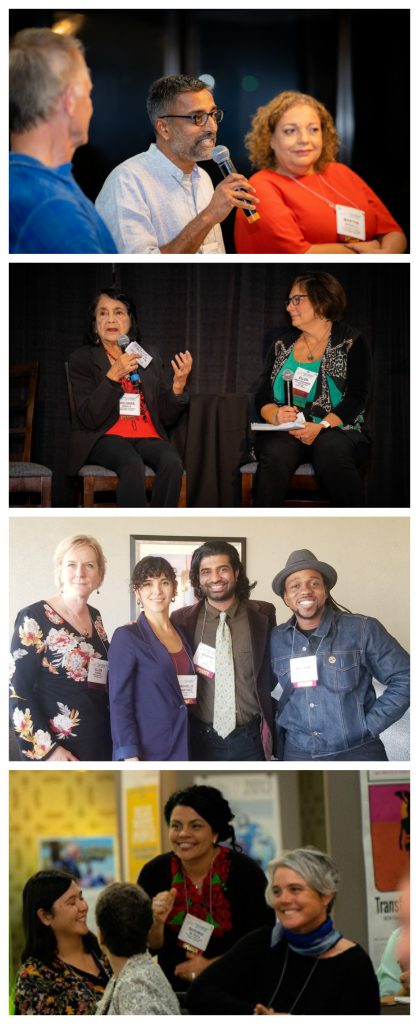
HEFN celebrated its 20th anniversary in Fresno, California, at the 2019 Annual Meeting, “The Transformative 2020s: Two Decades of Groundwork for a New Decade of Change.”
Thank you to everyone who could attend, making this the largest, most engaging HEFN meeting yet. Highlights included:
-
- An evening salon session, “Resilience: Preparing for an Uncertain Global Future with Transformative Change,” moderated by Michael Lerner, The Jenifer Altman Foundation, with speakers from Environmental Health Sciences, Movement Generation, and Physicians for Social Responsibility.
- Legendary civil rights activist Dolores Huerta, Dolores Huerta Foundation, as opening keynote speaker.
- Timely plenary sessions and dynamic speakers including “The Green New Deal: Centering Environmental Health & Justice in a New and Rapidly Expanding Movement,”
with climate justice leaders in a discussion moderated by Ellen Dorsey, Wallace Global Fund, and “Turning Points: How Environmental Health and Justice Play in the 2020 Election Cycle and Beyond,” moderated by Earl Lui, California Wellness Foundation, in a lively civic engagement session.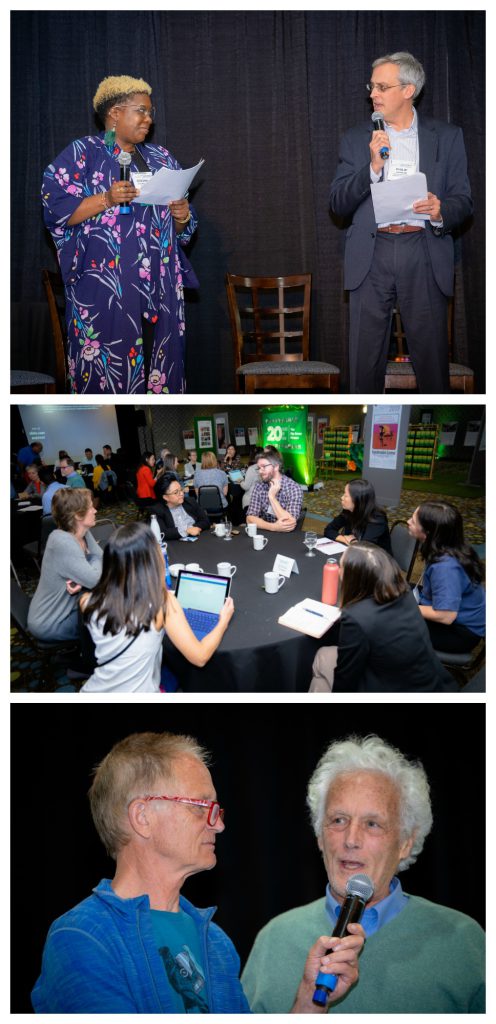
- A variety of funder-hosted breakfast roundtable discussions such as on climate, health and equity, hosted by The Kresge Foundation and Robert Wood Johnson Foundation; Movement infrastructure hosted by Mosaic; regenerative agriculture hosted by the newly formed group Funders for Regenerative Agriculture (FORA); and genetically engineered foods hosted by the C.S. Fund.
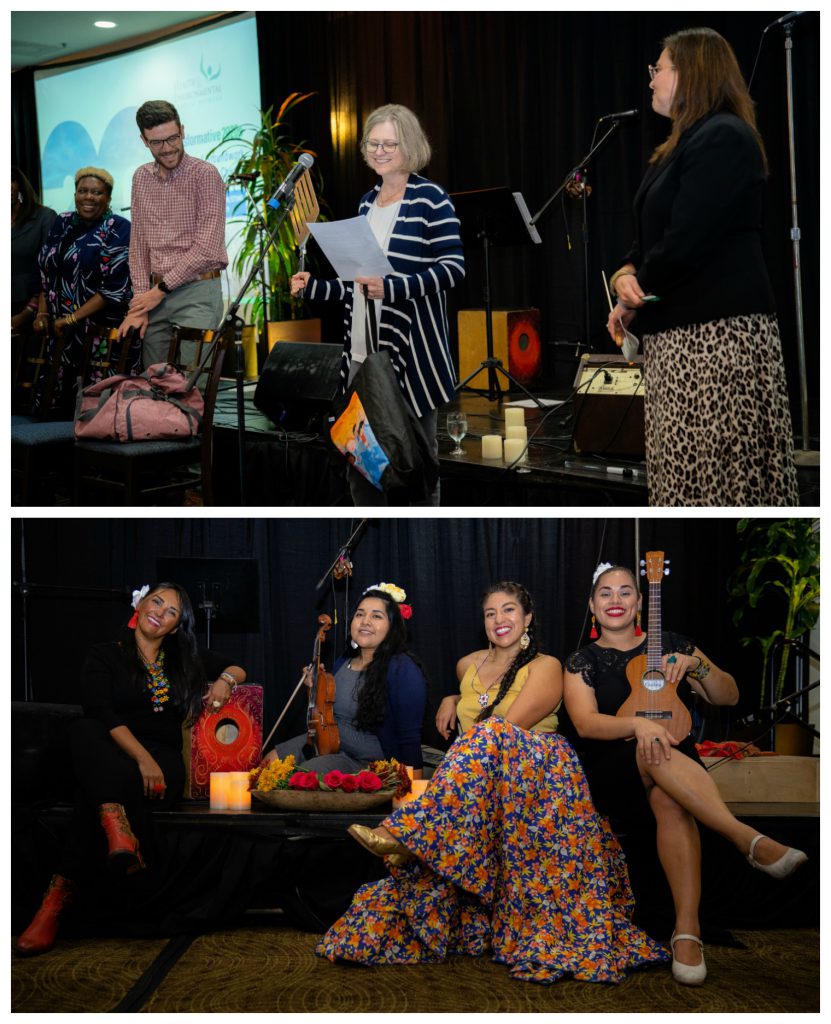 Celebrating HEFN’s past, present and future with a HEFN History session moderated by Phil Johnson, The Heinz Endowments, and Ogonnaya Dotson Newman, The JPB Foundation, and featuring long-time HEFN member Marni Rosen, Calibri. Other members spoke about funder work, outcomes and takeaways from primary HEFN focus areas over the past two decades including fracking, centering justice and equity in environmental health grantmaking, toxics work and climate, health and equity.
Celebrating HEFN’s past, present and future with a HEFN History session moderated by Phil Johnson, The Heinz Endowments, and Ogonnaya Dotson Newman, The JPB Foundation, and featuring long-time HEFN member Marni Rosen, Calibri. Other members spoke about funder work, outcomes and takeaways from primary HEFN focus areas over the past two decades including fracking, centering justice and equity in environmental health grantmaking, toxics work and climate, health and equity.- HEFN 20th Anniversary Celebration and Dinner honoring HEFN founders Michael Lerner, Jenifer Altman Foundation, and Pete Myers, Environmental Health Sciences; with leadership transitions, networking and a vibrant performance by Luna Lab. (photos by Samuel Contreras Photography)
Members And Leaders
The HEFN community welcomed new executive director Ansje Miller in October, after bidding a fond farewell to previous director, Kathy Sessions, who stepped down in July after 20 years of outstanding leadership. A ‘passing of the baton’ program at the HEFN annual meeting cemented the leadership transition as attendees thanked Kathy for the countless ways she led HEFN’s development into a force for environmental health and justice. During her tenure, Kathy shepherded the growth of HEFN and giving for environmental health, built collaboration with other funder groups, helped guide HEFN to a new strategic plan in 2016, and brought environmental justice into the heart of environmental health grantmaking.
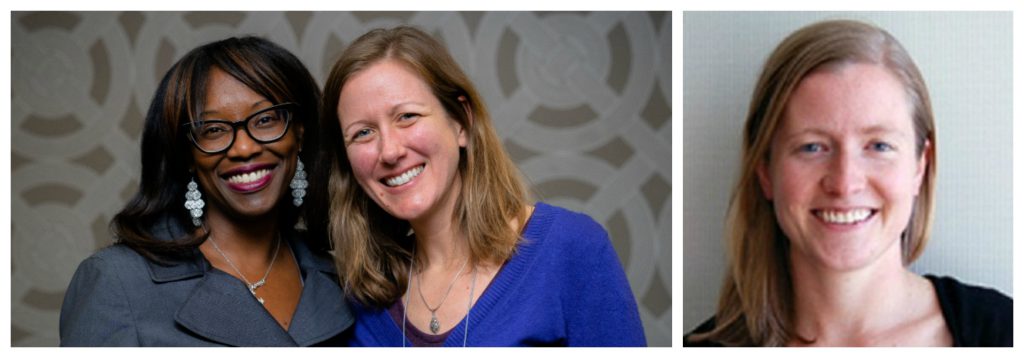
The network was guided throughout 2019 by a phenomenal Steering Committee, led by co-chairs Amy Panek, Park Foundation, who ended her term, and Jalonne L. White-Newsome, Kresge Foundation, who will be extending her co-chair role for 2020. Welcome to incoming HEFN Steering Committee co-chair Shorey Myers, Jenifer Altman Foundation, with thanks to Christine James, John Merck Fund, who will be extending her term on the eight-member committee.
HEFN members brought their expertise to the environmental health grantmaking front through numerous activities throughout the year, and were honored for their work:
Phil Johnson, director of the Environment and Health Programs at The Heinz Endowments, and former co-chair emeritus of the HEFN Steering Committee, began his term on the inaugural Steering Committee of the National Academy of Sciences, Engineering and Medicine’s Environmental Health Matters Initiative. The Environmental Management Association named Jalonne L. White-Newsome, senior program officer in the environmental program, Kresge Foundation, its 2019 Environmental Achievement Award winner. Ogonnaya Dotson Newman, The JPB Foundation, was named a 2019-2020 PLACES Fellow for The Funders’ Network for Smart Growth and Livable Communities. Numerous members across HEFN were featured speakers at the September One Water Summit including Sara Aminzadeh, Pisces Foundation; Elizabeth Cisar, Joyce Foundation; Tim Eder, Mott Foundation; and Jennifer Sokolove, Water Foundation. Allison Harvey Turner was named Chief Executive Officer of the Water Foundation, succeeding Wade Crowfoot who was appointed California’s Secretary for Natural Resources by Governor Gavin Newsom in January 2019.
HEFN welcomed 14 new members in 2019:
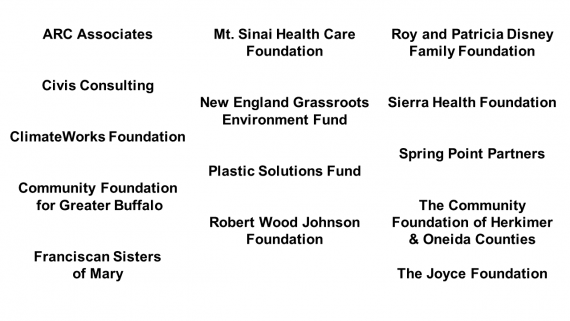
And sends a HUGE thank you to the generous supporters of the HEFN FORWARD campaign, bolstering HEFN’s capacity to move forward into 2020:
- 11th Hour Project
- Amy Panek
- Andrea Bretting
- California Endowment
- Canary Fund
- Carolyn Fine Friedman
- Ceres Trust
- Christine James
- Claneil Foundation
- Fred A. and Barbara M. Erb Family Foundation
- Garfield Foundation
- Hull Family Foundation
- Jake Mogan
- Jalonne L. White-Newsome
- Jenifer Altman Foundation
- John Merck Fund
- Kathryn Gilje
- Marisla Foundation
- Sierra Health Foundation
- Singing Field Foundation
- The Heinz Endowments
- The Kresge Foundation
- Wallace Global Fund
Philanthropic Partnerships And Field Service
HEFN staff actively consulted with peers in numerous PSOs, represented HEFN at other funder meetings, and developed joint programming. HEFN’s impact and reach is augmented through strong relationships across and beyond philanthropy. HEFN staff attended annual meetings hosted by TFN, CEFG, GIH, SAFSF, the United Philanthropy Forum, in addition to EGA’s Federal Policy Briefing and Fall Retreat to connect with new partners and strengthen existing relationships. HEFN co-sponsored a November webinar with EGA that was sponsored by the Regenerative Agriculture Foundation and hosted by SAFSF on “Connecting the Dots Between Human Health, Soil Health, & Plant Diversity.” HEFN supported Census work with the Funders’ Committee for Civic Participation and several other philanthropy-serving organizations by promoting FCCP’s monthly First Monday + Election Series webinars. New in 2019, HEFN joined FCCP and CHANGE Philanthropy in providing a daily dispatch of highlights from each of the organizations’ annual meetings that overlapped dates in mid-November.
HEFN actively participated in the United Philanthropy Forum, a network of philanthropy-serving organizations (PSOs), through peer community learning for staff and valuable opportunities to build relationships with other PSOs and regional associations.
Staff also provided “office hours” consultations last year, offering strategic, development or organizational advice to funders, nonprofits, researchers, and staff of other funder groups.
Upcoming In 2020
Save the date to attend HEFN’s 2020 Annual Meeting from Nov. 9-11 in New Orleans, Louisiana!
- Learn more about how to join HEFN. Benefits include discounted registration rates for HEFN meetings, access to member-only programs and a grants data portal, skills-building and leadership development opportunities.
- Sign up online to join HEFN’s topical email groups supporting funder peer exchange on critical environmental health and justice topics.

